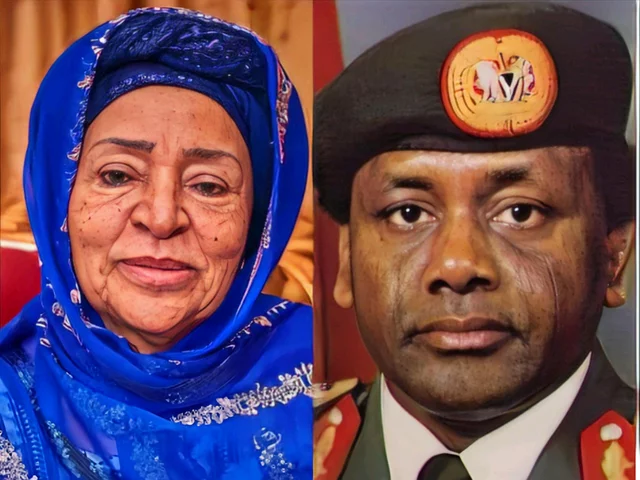By The9jaTREND
Maryam Abacha, widow of former Nigeria Head of State, General Sani Abacha has strongly rejected former President Ibrahim Babangida’s recent claims that her husband orchestrated the controversial annulment of the June 12, 1993 presidential election won by Moshood Abiola.
Maryam Abacha defended her late husband’s reputation during an interview with TVC from 6:35, dismissing suggestions that he was responsible for one of Nigeria’s most contentious political decisions.
“I’m not here to talk about Babangida or anybody. All I know is that that annulment was not done by my husband, and if it was him, then that means he was very powerful,” she stated.
Maryam Abacha used ironic logic to challenge Babangida’s account, suggesting that if Abacha had indeed orchestrated the annulment, it would demonstrate unprecedented influence over the sitting president.
“He was even more powerful than the President. And if the President is there and somebody else is calling the shots, then that means Abacha was the greatest,” she declared.
Her comments respond to recent claims by Babangida, who formally announced the election annulment in a national broadcast on June 24, 1993. The former military president has recently attempted to shift responsibility for the controversial decision.
In his latest assertions, Babangida claimed that Abacha had accumulated excessive power within Nigeria’s fragmented military establishment, making it nearly impossible to remove him even after stepping down from office in August 1993.
Babangida has alleged in his recent autobiography that events spiraled beyond his control, particularly regarding the actions of National Electoral Commission Chairman Professor Humphrey Nwosu.
According to Babangida’s account, Professor Nwosu announced the suspension of June 12 election results on June 16, 1993, without presidential authorization, catching the military leadership off guard.
Babangida claimed he immediately recognized that hostile forces were working against his administration’s interests and that the situation required careful handling.
The former president also alleged that mysterious legal maneuvers complicated the electoral process, citing what he described as irregular court intervention.
He noted that a “strange court order was obtained from Justice Saleh’s court in Abuja, stopping the release of the results of the election,” suggesting external manipulation of the judicial process.
While Babangida acknowledged that annulment had been considered among various options for handling the electoral crisis, he insisted that the final execution differed significantly from any planned approach.
However, political analysts have criticized the timing of Babangida’s revelations, arguing that his explanations come too late to be meaningful, particularly since the accused party cannot respond.
Many experts contend that Babangida’s claims are “way too late as the late accused, Gen Abacha has no right to reply,” raising questions about the fairness and motivation behind these posthumous accusations.
The June 12, 1993 election remains one of Nigeria’s most significant political events, widely regarded as the country’s freest and fairest presidential contest. Moshood Abiola’s apparent victory was annulled amid claims of irregularities, leading to years of political turmoil.
The dispute between the Abacha and Babangida camps reflects ongoing efforts by key players from that era to shape historical narratives about their roles in Nigeria’s democratic transition.
